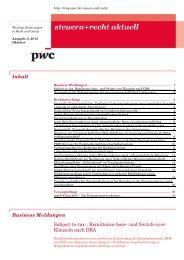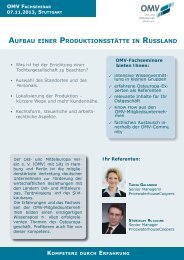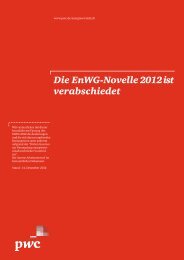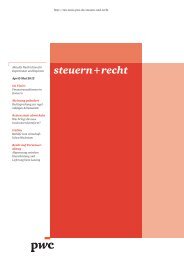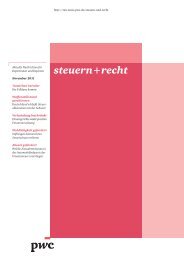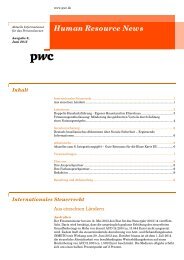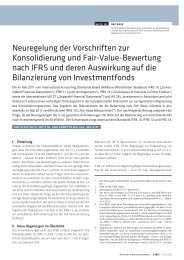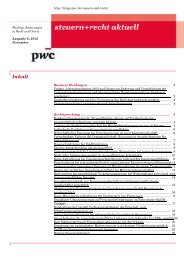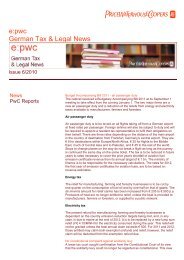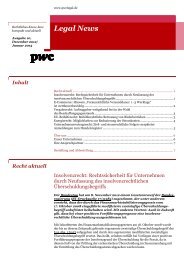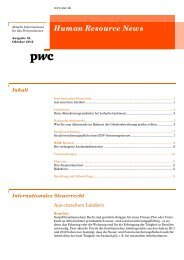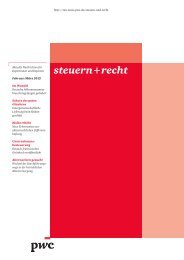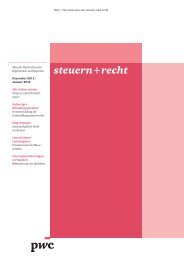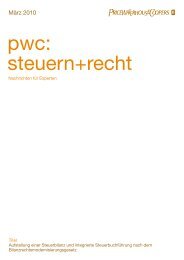Download legal-news-issue-7-2011 - PwC Blogs
Download legal-news-issue-7-2011 - PwC Blogs
Download legal-news-issue-7-2011 - PwC Blogs
Create successful ePaper yourself
Turn your PDF publications into a flip-book with our unique Google optimized e-Paper software.
Supreme Tax Court Cases<br />
Tax & Legal News October 13, <strong>2011</strong> 4<br />
tender takes precedence over the tax exemption for exports or intra-community supplies<br />
to other businesses. Thus, recording the transaction as a sale does not open the way to an<br />
input tax deduction.<br />
Full rate VAT on ensemble fees charged to theatres<br />
Entrance tickets to theatres, concerts and similar performances are subject to reduced<br />
rate VAT. However, this does not apply to charges to theatres and other organisers by<br />
visiting ensembles for performances under their own direction. Rather, these charges are<br />
a standard rate service. A finance ministry decree has emphasised this position, whilst<br />
allowing visiting companies to continue to charge reduced rate VAT for performances up<br />
to December 31, <strong>2011</strong>.<br />
Foreign limited partnership does not shield non-trading income from<br />
German taxation<br />
The taxpayer held most of the capital in a Hungarian limited partnership (Bt. equivalent<br />
to a German KG) as a limited partner. The only general partner had its own limited<br />
liability as a Kft., the equivalent of a German GmbH. Had the partnership been registered<br />
in Germany, if would thus have been a GmbH & Co. KG and its entire income would<br />
automatically have been recast as trading income, as though it had been earned through a<br />
corporation. In Hungary, all partnerships are taxed as corporations, with partners’<br />
drawings against profits being treated as dividends. The partnership’s sole business<br />
activity lay in letting a fully equipped factory to a related party. The taxpayer maintained<br />
that the net profits of the partnership should be exempt in Germany as the trading<br />
income from a foreign permanent establishment. He based this claim on the alternative<br />
contentions that (a) the partnership was taxed as a corporation and therefore as a trading<br />
entity in Hungary, or (b) the partnership’s income was trading income by German <strong>legal</strong><br />
definition. The Supreme Tax Court has now rejected both contentions.<br />
The court took the view that the Hungarian taxation of the Hungarian entity was a matter<br />
for Hungarian law. The Hungarian tax status of an entity was not decisive for the German<br />
taxation of its partners. This depended on the nature of their income as defined by the<br />
double tax treaty. That income was taxable, or exempt, in Germany following the<br />
provisions of the treaty. Similarly, the court refrained from applying the German domestic<br />
rule redefining partnership income as trading income if earned through a partnership<br />
with no ultimate unlimited liability, where this was in conflict with the treaty allocation of<br />
taxing rights.<br />
The ultimate conclusion was thus to split the income into its component parts. That<br />
earned from letting the Hungarian property was taxable in Hungary and exempt in<br />
Germany under the treaty. That earned from the hire of plant and equipment (from<br />
moveable assets) was taxable in Germany in the hands of a German resident partner.<br />
Supreme Tax Court judgment I R 95/10 of May 25, <strong>2011</strong> published on August 10<br />
No write-down of fixed-interest securities below nominal value<br />
A bank held a significant portfolio of debentures and other fixed-interest securities as<br />
current assets. It took them up initially at cost but wrote them down in its annual<br />
accounts to the lower stock market value on balance sheet date. This treatment was<br />
correct under the accounting provisions of the Commercial Code, but the tax office<br />
refused to accept it to the extent that the write-down took the net book value below the<br />
nominal amount. It argued that the valuation provisions of the Income Tax Act only<br />
allowed a write-down as necessary to reflect a “foreseeably lasting” loss in value. Fixedinterest<br />
securities were generally redeemable at the end of a fixed term and at their<br />
nominal value. Thus any current loss below this level could not be “lasting”.<br />
The Supreme Tax Court has now held with the tax office and for the same reason. The<br />
bank argued that securities held as current asset were for trading and there was no reason<br />
to suppose that they would be held until redemption. The court, though, pointed out that<br />
there was also no reason to suppose that they would be sold before redemption. This<br />
unknown destiny meant that the loss in market value at balance sheet date might, or<br />
might not, be “lasting”, but its ultimate incidence was certainly not “foreseeable”. This<br />
departure of tax law from the Commercial Code was emphasised with the recent<br />
”BilMoG” accounting reform, which required marketable securities to be carried at



